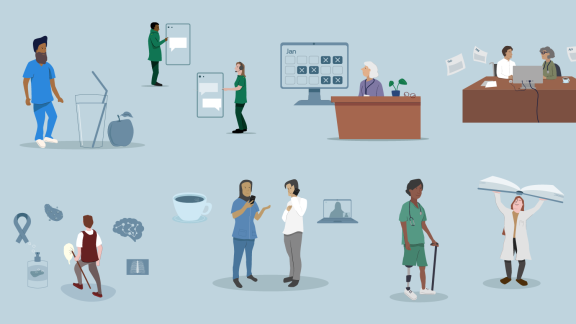Mental Maintenance at NEAS: a proactive approach to staff mental health

The North East Ambulance Service NHS Foundation Trust (NEAS) provides emergency medical and patient transport services to a population of 2.7 million people in the North East region, employing over 3,400 staff members. Exposure to traumatic events, the demands of shift working and an uncertainty of what’s in store each day, can impact ambulance staff mental health.
Overview
NEAS staff expressed concerns that existing mental health campaigns often lacked clarity and consistency in the psychoeducational resources available and perspectives on mental health varied across staff members. In response, the Mental Maintenance campaign was launched to shift focus from crisis response to a regular, proactive approach through tailored toolkits, education and peer support.
Key benefits and outcomes
- The 2024 NHS Staff Survey showed more staff recommending NEAS as a workplace compared to 2023, with ambulance staff feeling better supported by their managers.
- 77 per cent of staff surveyed found the toolkits and training beneficial, leading to increased confidence and proactive mental health management.
- The Mental Maintenance campaign encourages open conversations and inspires staff to take ownership of their mental health, shifting crisis response to everyday maintenance.
- The campaign provides managers with tailored training and one-on-one advice to effectively support their teams and create a healthier work environment.
- The toolkits offer structured guidance, incorporating cognitive therapy techniques, mindfulness practices, and psychoeducation to help staff reconnect with effective coping strategies.
- The campaign focuses on psychological safety, promoting consistent language around mental wellbeing, and reducing stigma.
What the organisation faced
NEAS staff reported a lack of clarity around mental health resources and they were overwhelmed with choice. Staff said they felt a lack of consistency in mental health approaches and there were differences in how mental health was viewed between staff from different ages and lengths of service. Staff made it clear they wanted an individualised approach to wellbeing rather than a one size fits all approach.
This led to the development of the Mental Maintenance campaign with the aims to:
- shift staff perspectives on mental health, encouraging regular maintenance rather than crisis-only intervention.
- equip all staff with the personal skills and resources to look after their mental wellbeing.
- ensure managers are confident in supporting their team’s mental health.
- ensure senior leaders create a stigma-free culture which creates the conditions for staff to thrive.
What the organisation did
The project was developed through collaboration with staff networks, union representatives and staff of various age groups, backgrounds, and job positions. The staff experience and communications teams developed surveys and conducted focus groups to gather staff insights to shape the toolkits and ensure the content reflected the realities of ambulance sector work. Union representatives are receiving training and toolkit copies to confidently facilitate wellbeing conversations and promote toolkit use among staff. A continuous improvement model was adopted to refine the toolkits through workshops and feedback sessions.
The mental maintenance employee toolkit and personalised plan are designed to be used as a physical copy to act as a grounding tool and to help staff step away from distractions, pause, reflect and reconnect with what personally works for them. Designed using an evidence-based approach, the toolkits help staff identify triggers and early warning signs to support their mental wellbeing.
The toolkit includes:
- Cognitive therapy techniques to name and challenging negative thoughts.
- Mindfulness techniques to manage overthinking.
- Behavioural activation techniques focusing on actions that enhance wellbeing.
- Interpersonal therapy tools to provide staff with the skills to build support networks.
- Activity scheduling to encourage staff to identify small, manageable self-care routines to help staff integrate mental health maintenance into their busy lifestyles.
The trust conducts training sessions during induction and ad-hoc team workshops throughout the organisation, ensuring that every new staff member receives a hard copy of the toolkit along with guidance on how to complete it. Informal drop-in sessions are also offered, where staff can collaborate on their plans, exchange ideas and learn from one another. This collaborative approach encourages staff to continue using the toolkit throughout their engagement with mental health support services.
NEAS mental maintenance managers toolkit
Leadership plays a key role in culture shift and making mental health part of the everyday conversation. At NEAS this led to the development of the managers mental maintenance toolkit. Aiming to equip managers with the confidence and resources to support their teams while handling difficult mental health conversations and maintaining their own wellbeing.
In the project's first two months, in-person group training sessions were held. These covered themes from the manager toolkit and were used to identify any barriers to engagement. One to one advice is offered to managers following a team members mental health referral. Team workshops are offered when a team is identified as needing mental health support. Managers are encouraged to reach out proactively with concerns.
Results and benefits
Since its launch in May 2023, 77 per cent of survey respondents found the training beneficial for managing their mental wellbeing. Positive testimonials have highlighted increased empowerment, understanding and hope. NEAS has also seen an increase in Occupational Health (OH) mental health referrals. This has been attributed to a growing comfort in addressing mental health and staff taking proactive steps toward wellbeing. Colleagues often cite their managers encouragement as key to their OH referral.
In January 2024, the Association of Ambulance Chief Executives requested permission to expand the mental maintenance material and branding to all statutory ambulance services across the UK, with a new logo for national scaling.
Results from the 2024 NHS Staff Survey indicated that more staff are recommending NEAS as a place to work compared to 2023 and operational ambulance staff feel better supported by their managers.
The success of the NEAS Mental Maintenance Toolkit has been attributed to the combination of personalised guidance, training programs and increased self-awareness among staff. By focusing on staff mental health, NEAS ensures that ambulance responders are balanced, aware of their needs and better equipped to manage the stresses of their roles.
Overcoming obstacles
The concept for the toolkit emerged from staff conversations and findings about the mental health challenges they face at work and beyond. Employees voiced concerns about mental health stigma, lack of confidence in having wellbeing conversations, and confusion over where to find guidance amidst an overwhelming number of online resources and apps. There was a clear need for a brand that not only raised awareness but also promoted proactive mental health practices. The toolkit addresses this gap by offering a tangible, personalised plan tailored to individual needs.
Mental health is complex, and while the approach is still evolving, NEAS feels the Mental Maintenance toolkits have sparked crucial conversations, helping to identify underlying issues and clarify how the trust can better support staff.
Takeaway tips
- Empower staff by providing tools that encourage personal ownership of mental wellbeing.
- Promote psychological safety and open communication within teams to reduce stigma.
- Collaborate with staff networks, union representatives, and teams to ensure resources are relevant and inclusive.
- Use evidence-based techniques to develop practical strategies.
- Engage and train managers to confidently support mental health conversations.
- Regularly assess the impact through surveys and feedback and the ability to use the data to make improvements.
- Keep going: changing culture takes time, and all organisations will always have more to do.
Further information
For more information about the Mental Maintenance toolkits, contact Andy Walton NEAS Staff Psychological Wellbeing Advisor.



